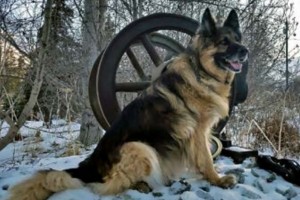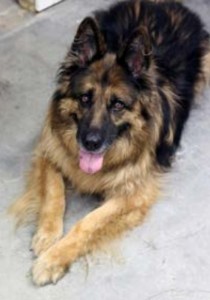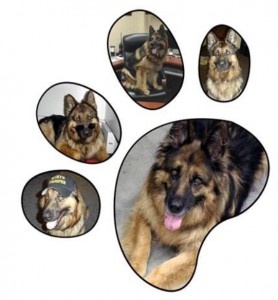
Alaska State Troopers’ drug detection K9 Kilo is retiring on Friday after 10 years – or 66 in human years – working as a four-legged trooper.
During his distinguished career, the long haired German Shepherd conducted more than 400 searches and was instrumental in the seizure of a total of approximately 122 kilos of marijuana, seven kilos of methamphetamines, 16 kilos of heroin, 19.5 kilos of cocaine and $1.8 million in cash and property involved in the illicit drug industry. This was while working as a single-purpose canine with Alaska State Troopers drug investigators.
At only 1-1/2 years old, Kilo started working with trooper Jess Carson – first in Fairbanks for three years, and then for the Western Alaska Alcohol and Narcotics Team out of Bethel for two years. The pair traveled extensively throughout Western Alaska, sniffing out drugs at airports and at postal facilities.
Carson said it felt like the duo spent about as much time traveling as they did at home. Luckily, Kilo adjusted well to spending nights in hotel rooms and traveling on just about every method of transportation available in Alaska. That included all-terrain vehicles and small airplanes.
“We’d travel in a small plane to a village and five minutes later he’d calm down and I’d have him working,” Carson said.
School children throughout Alaska got a chance to meet the friendly, fuzzy canine. If Carson had enough advance notice, he would try to schedule school visits during his trips to Dillingham, Kotzebue and Nome. He also did appearances in any Fairbanks school that requested one. Carson estimates they did roughly 50 appearances in schools and other agencies because “Kilo was so easy to manage.”

That also made him a good fit for Carson’s family which already included children. Even if he was considered easy to manage, he was still a young, hyper dog. Those days are long gone. His current handler, Investigator Vance Peronto, said Kilo does quite a bit of napping and has been dealing with ongoing health issues. Last year, an ointment to treat an ear infection caused Kilo to go deaf for a few months. Peronto doesn’t know if his furry partner has regained all of his hearing or if Kilo uses it as an excuse.
“I think he’s partially ignoring me” when he catches Kilo getting into something he shouldn’t be, Peronto said. While stern words may not work, clapping his hands promptly gets his partner’s attention.
Kilo was among a class of canines that saw great successes after certifying in drug detection in 2005. Out of a class that included canines Yukon, Custa and Sirius, Kilo is the only one that is still working. His retirement means troopers will only have eight working canines. Kilo worked with three handlers during his 10-year career – Carson, Eric Spitzer and finally Peronto, who will keep Kilo after the dog’s retirement on Friday. When Spitzer was selected to become a corporal at the academy, Peronto jumped at the chance to be a canine handler, transferring from the Major Offenders Unit to the DEA Task Force in 2011. However, Peronto first had to learn to become a K9 handler.
“Kilo had game already. I had to get his game,” Peronto said. That meant five weeks of one-on-one training with canine instructor Sgt. Scott Johnson, the statewide canine coordinator for much of Kilo’s career.
The different types of drugs the dogs are trained to detect are first hidden in a toy to help dogs become familiar with the different drug odors. When dogs detect the presence of the drug odor, they’re rewarded with a toy. In training, the toy seemingly magically appears when the canine correctly indicates to the presence of the odor of drugs. Handlers and instructors keep the toy hidden and use various methods, including sleight of hand, to introduce it at the spot where the drugs are hidden to reward their partner for a job well done and to teach the dog that their indication on the odor is what caused their toy to “appear.” This connection establishes the task of detecting drug odors as more fun than work for the dogs. The K9 teams undergo a rigorous certification process to ensure their reliability before being allowed to work the street. They also go through routine training and re-certification throughout their career to keep skills current.

Kilo has been instrumental in some substantial busts during his career. The one that sticks out the most to Carson came from drugs found in a brand new Corvette following a traffic stop conducted by a patrol trooper in Fairbanks. The defendant had bought the car the previous week and had to hand it over to the state after he was caught transporting drugs with it.
“It still smelled new,” Carson said. “It had 212 miles on it.”
Peronto was sometimes astonished that his partner, upon command, could easily pick out a suspicious box among a room filled with, at times, 100 parcels of mail.
“He would bee-line directly to the suspicious parcel, alert, and immediately indicate,” Peronto said. “As if to tell me, ‘Was this supposed to be hard?’”
 One memorable sniff under these conditions, Kilo honed in on a medium size coffee can filled with mustard and resealed by the shipper. During the search warrant service, postal inspectors unsealed it with a can opener to reveal that swimming deep in the mustard was three ounces of heroin heat sealed and wrapped in plastic. Needless to say, after that the postal inspectors regarded Kilo as the master of scent detection, “something that we already knew him as,” Peronto said.
One memorable sniff under these conditions, Kilo honed in on a medium size coffee can filled with mustard and resealed by the shipper. During the search warrant service, postal inspectors unsealed it with a can opener to reveal that swimming deep in the mustard was three ounces of heroin heat sealed and wrapped in plastic. Needless to say, after that the postal inspectors regarded Kilo as the master of scent detection, “something that we already knew him as,” Peronto said.
While Peronto realizes that Kilo is a law enforcement tool, he’s been much more than that to his human partner. “He’s been my rock and anchor.”
Now Kilo can relax into a life of leisure with Peronto who will soon transfer to a position in the Soldotna ABI office. There will be a small celebration to send Kilo off after his long distinguished career. No retirement party would be complete without parting gifts. Kilo’s will be gift certificates for his favorite treat – ice cream.
Source : Trooper Times[xyz-ihs snippet=”Adsense-responsive”]
[content id=”18649″]





